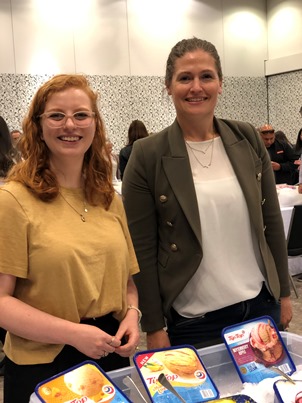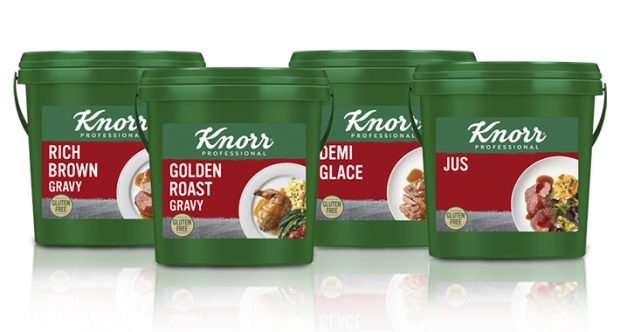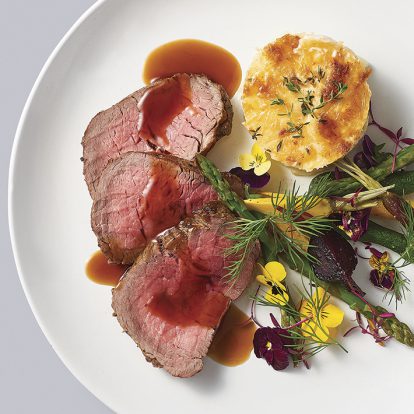Spicy vegan sausage crowned winner at 2019 FoodStarter competition
A vegan sausage has sizzled its way to the top of the 2019 FoodStarter competition in Christchurch, in an impressive display of South Island food innovation dominated by a plant-based and vegan theme.
The ‘Bambina’ sausage was one of 121 entries to the FoodStarter competition, a partnership between Foodstuffs South Island and the Ministry of Awesome (MoA), based at the Te Ōhaka Centre for Growth and Innovation, at Ara Institute. Over 90 per cent of entries had a health, environment and dietary awareness focus, with four of the top five products being vegan.
The winning Italian-style sausage was created by Ananda Simply Wholefoods founders Fernando Gutierrez and Marita Lopez, after they felt there was a gap in the market for a tasty vegan sausage that wasn’t trying to imitate meat. “When we first arrived in New Zealand from Argentina seven years ago, we realised there was a gap in the market for a good, high protein, plant-based product.”
The Foodstarter 2019 Pressure Cooker final was judged on Wednesday 20th November at Foodstuffs South Island HQ in Christchurch by Foodstuffs South Island Chief Executive Steve Anderson, Ministry of Awesome Chief Awesome Officer Marian Johnson, Editor-in-chief, Lifestyle & Style at Stuff NZ Geoff Collett, Head of Business Development FoodSouth Tracey Sheehy, and MYOB marketing manager Krissy Sadler-Bridge.
All the judges agreed Ananda’s vegan sausage was something special. Foodstuffs South Island CEO Steve Anderson, says, “All the top five entries showed stunning innovation, but Ananda Simply Wholefoods vegan Bambina sausage was exceptional. You can’t tell it’s plant-based – we thought there must be some kind of meat in there, but there’s definitely not. The balance of flavours and textures make it a truly worthy winner.”
Fellow judge Marian Johnson, Chief Awesome Officer at Ministry of Awesome says it’s the first vegetarian sausage she’s had that stands up to a traditional meat sausage. “I often buy vegetarian sausages and I’ve tried many, but this was amazing – it actually tasted like a lovely spicy pork sausage,” she says. “It held together really well and had the kind of texture you’d expect from a good sausage. It was an incredibly tough competition, and we saw an outstanding display of innovation, invention and passion from all five of our finalists.”
Gutierrez and Lopez both grew up watching their parents cook and share food with family and friends, and believe vegan products will increasingly become part of the family food landscape. “Marita and I have extended family all through Europe as well as Argentina; the idea of food as a way to bring people together is a common thread all over the world, including New Zealand,” says Gutierrez. “New Zealand is all about barbecues and sharing plates, and more people are looking for alternatives to meat, which the Bambina is. It’s slightly spiced with fennel seeds and paprika, is lovely and chewy, and gets crispy when it’s shallow-fried.”
Although the Bambina looks and cooks much like a meat sausage, there’s none of the grit or meaty flavour found in some vegan and vegetarian options on the market. “We never wanted to make something that was pretending to be meat,” he says. “This is not pretend meat, either in looks or smell.”
The concentration on plant-based and locally sourced ingredients was very much a running thread at the FoodStarter competition, which is in its second year. “The entries showed just how impactful the current trend for plant-based and vegan is,” says Johnson. “We’re in the early adopter phase at the moment, but we are seeing a lot of startups in that area.”
The FoodStarter competition aims to identify the most innovative and promising food or beverage product in New Zealand, and assist the winner to bring it to production. The $75,000 business incubation prize package includes product development from FoodSouth, brand and design guidance from Strategy Advertising, business acceleration support at Te Ōhaka – Centre for Growth & Innovation at Ara Institute; guidance from the team at MYOB; and the biggest prize of all – guaranteed placement of the winning product in all New World supermarkets across the South Island – a prize Gutierrez and Lopez say is life-changing.
“This will change our direction, and that’s exactly what we want,” says Gutierrez, who worked as a full-time landscaper until two months ago, before moving to part-time hours so he could concentrate on making sausages. “Until now we’ve sold our sausages at farmers markets and to some small stores and restaurants, but now we have a lot to do!”
FoodStarter 2019 finalists
Winner: Ananda Simply Wholefoods vegan sausage
- The Sheep Milk Supply Group with Baa2 and BaaBuzz sheep milk yoghurt
- Good Puds – plant-based prebiotic pudding pots to improve gut health
- Grater Goods – plant-based pastrami
- Porpy and Pinkies vegan Kiwi Onion Dip
For more information, visit www.FoodStarter.co.nz
Marco Pierre White – from Enfant Terrible To Mellow Sage
British celebrity chef and restaurateur Marco Pierre White (also crowned Enfant Terrible), famously handed back the three Michelin stars he was awarded over his stellar career, when he gave up cooking 20 years ago.
And of those three stars, earned when White ran Restaurant Marco Pierre White, and The Oak Room, he says, “I didn’t win them, it was the team behind me. I was the conductor, the composer – without the team what can you achieve?”
In Auckland in November for his international judging role at Taste of Auckland, the godfather of modern dining met up with Hospitality Business. Demonstrating to an invitation-only group of chefs and guests at a foodservice professionals event by Unilever Food Solutions, it’s obvious White now appreciates simplicity in modern cuisine! To find out more about the enfant terrible’s new approach to the culinary world – watch out for our summer edition – out now!
Burger King is doubling down on meatless burgers
The Restaurant Brands International chain has announced plans to launch a vegetarian burger in more than 20 markets across Europe. The Rebel Whopper, made with patties from Unilever-owned The Vegetarian Butcher, will be available in more than 2,400 European locations.
Burger King first launched the Rebel Whopper and another meatless sandwich, the Rebel Chicken King, in Sweden earlier this year.
In the United States, the burger chain will test substituting beef patties with Impossible patties in its Whopper Jr. burgers and signature hamburgers. The company said 180 restaurants in Milwaukee, Cedar Rapids, Augusta, Cincinnati and Buffalo will test the extended Impossible burger line.
Thanks in part to the success of the Impossible Whopper, Burger King’s U.S. same-store sales grew by 5 percent during its third quarter, its largest jump since 2015.
“The Impossible Whopper is a huge hit with our guests and has quickly become one of the most successful product launches in Burger King’s history,” Restaurant Brands CEO Jose Cil told analysts on the company’s conference call in October.
Cil also said on the call that the company is working on meatless products for Latin America and Asia as well.
Burger King’s announcement comes as some of its biggest competitors have been slower to jump on the meat alternative trend. McDonald’s is testing a burger made with Beyond Meat patties at select locations in Ontario, Canada, while Wendy’s is testing black-bean burgers.
Restaurant Brands’ stock, which has a market value of $31 billion, is up 28% so far this year. Shares of McDonald’s, valued at $148 billion, have risen 8% in the same period, while Wendy’s stock, which has a market value of $5 billion, has jumped 33% year to date.
Sweet success for ice cream producers
More than 300 entries across 13 categories competed for the New Zealand Ice Cream Awards this year with a diverse range of winners reflecting the variety and quality of our ice cream.
Run by the NZ Ice Cream Manufacturers Association (NZICMA), the more than 300 entries were judged by an independent panel of expert food industry judges using a blind judging process and strict criteria.
Hannah Wood, representative of NZICMA and Founder & Chief Gelato Maker at boutique manufacturer Little ‘Lato, says New Zealand-made ice cream and gelato is arguably the best in the world, made from our top quality dairy and other locally sourced ingredients, and the awards are a great opportunity to showcase this.
“It’s fantastic to see so many different ice cream makers – from smaller boutiques to large established manufacturers – take out the coveted ‘Best in Category’ trophies. It demonstrates the high level of quality overall, which is great news for anyone who loves ice cream and gelato,” says Hannah.
Already well-known for its other artisan dairy products, Zany Zeus not only won the ‘Premium Ice Cream’ category but also scooped the  Supreme Award for boutique manufacturers for the first time with its Ghana Chocolate ice cream. The judges commented on the ice cream’s dark, rich chocolate flavour, which leaves a clean mouthfeel, calling it absolute indulgence.
Supreme Award for boutique manufacturers for the first time with its Ghana Chocolate ice cream. The judges commented on the ice cream’s dark, rich chocolate flavour, which leaves a clean mouthfeel, calling it absolute indulgence.
Proving that sometimes you just can’t beat the classics, Tip Top once again won the ‘Standard Ice Cream’ category with its Boysenberry Ripple ice cream and the 2019 Supreme Award for large manufacturers – the fifth time this flavour has taken this top spot.
There is one category that changes each year to highlight a star ingredient, and for 2019 it was all about nuts. The winner of the ‘Best of Nuts’ category was Little ‘Lato, which made hazelnuts sing in its winning Hazelnut Chocolate gelato. Little ‘Lato also took out the ‘Open Creative’ category with something a little bit different, Massaman Curry gelato.
Judges said that the spicy, sweet Massaman Curry gelato delivered a unique hint to the complex flavours of the popular Thai dish and is a great example of the innovation NZ ice cream makers bring to the ‘Open Creative’ category. There was no shortage of creativity for this year with other entries including turkey with white chocolate gravy and stuffing, and beetroot and ginger.
Talley’s Group proved themselves masters of vanilla, taking out the ‘Standard Vanilla Ice Cream’ category with their Oravida Vanilla as well as the ‘Premium Vanilla Ice Cream’ category with Motueka Creamery’s Mt. Arthur Snowfall Vanilla.
“For an insight into new ice cream trends, the New to Market Award is one to watch. It is judged across all the categories for a new product that has been released in the last 12 months,” says Hannah.
Ranking as ‘extra yummy’ on the ‘yum to yuck scale’, Puhoi Valley Cafe’s Puhoi Choc Bomb has landed the Kids Choice Award as voted by a group of VIP 8-12 year old guest judges from local YMCA holiday programmes.

Killinchy Gold received two silver awards for their Maple Syrup and Walnut ice cream in the nuts category, and their Toffee Crunch ice cream in Premium ice cream.
NZ Ice Cream Week culminated in NZ’s national ice cream day, Ice Cream Sundae, on November 17 when Kiwis were encouraged to find their own way to celebrate the role ice cream plays in their lives.
“With summer just around the corner, it’s perfect timing to check out some of the award-winning ice creams, maybe try something new, and show support for local ice cream makers, suppliers and communities across New Zealand who are involved in making our much-loved frozen treat,” says Hannah.
2019 NZ Ice Cream Award winners:
Supreme Award winners
- Boutique Manufacturer: Zany Zeus Limited, Ghana Chocolate
- Large Manufacturer: Tip Top Ice Cream, Tip Top Boysenberry Ripple
Category winners
- Standard Vanilla Ice Cream: Talley’s Group Ltd, Oravida Vanilla
- Standard Ice Cream: Tip Top Ice Cream, Tip Top Boysenberry Ripple
- Best of Nuts: Little ‘Lato, Hazelnut Chocolate
- Premium Vanilla Ice Cream: Talley’s Group Ltd, Motueka Creamery Mt. Arthur Snowfall Vanilla
- Premium Ice Cream: Kāpiti Ice Cream, Kāpiti Fig & Manuka Honey (joint winner)
- Premium Ice Cream: Zany Zeus Limited, Ghana Chocolate (joint winner)
- Open Creative: Little ‘Lato, Massaman Curry
- Kids Choice: Puhoi Valley Café, Puhoi Choc Bomb
- Gelato: Gelato Roma, Salted Caramel
- Sorbet: Gellicious Gelato Ltd, Blackcurrant Sorbet
- Low Fat: Zany Zeus Limited, Feijoa
- Non-Dairy: Little Liberty Creamery, Little Liberty – Double Espresso
- New to Market: Gelissimo Gelato, Pistachio Premo
Ellen DeGeneres & Portia de Rossi invest in Californian Dairy-Free Brand
Miyoko’s Creamery, a leading Californian plant dairy brand known for its award-winning vegan cheeses and butter, has announced the addition of Ellen DeGeneres and Portia de Rossi as investors. The undisclosed funding amount supports Miyoko’s position as a leader in the plant dairy category as they prepare to introduce groundbreaking new products in early 2020.
DeGeneres and de Rossi, who both share Miyoko’s company mission for promoting a more ethical and sustainable world, have been longtime fans of the brand.
“Being kind to one another is not just about people, it extends to animals as well,” said DeGeneres. “Portia and I have been customers of Miyoko’s Creamery for several years now and their cheeses and vegan butter have become staples in our home. As we learned more about the mission behind the products and about Miyoko herself, we knew this was a special and exciting company that we wanted to support.”
de Rossi cited Miyoko’s recent announcement to help a farmer transition away from animal agriculture to plants to be used as the company’s research and development farm as another reason to support the company.
“We are particularly impressed about their holistic perspective to the challenge of moving our society away from animal agriculture,” said de Rossi. “They understand the big picture — that farmers are part of the solution and require our support to transition away from current practices – it takes this holistic view to transition our world to plant-based diets.”
“We have long admired and appreciated how Ellen DeGeneres and Portia de Rossi have used their platforms to advocate for a better world,” said Miyoko Schinner, Miyoko’s Founder and CEO. “With their support, Miyoko’s Creamery will be better equipped to do our part in helping to further this important shared mission.”
Since its launch just five years ago, Miyoko’s has introduced a wide range of celebrated plant dairy products that not only set a higher standard for taste and quality within the vegan dairy industry, but that are cruelty free and significantly better for the environment, producing 98% less greenhouse gases than their traditional dairy counterparts.
About Miyoko’s Creamery
Miyoko’s Creamery, a registered B-Corp, is the maker of dairy products made 100% from plants, and was founded on the principle of compassion for animals and eliminating them from food production. Miyoko’s products are sold in over 12,000 retail locations across the US, including Target, Trader Joe’s, Walmart, Kroger, Whole Foods, Sprouts, and thousands of other stores across the country and internationally in Canada, Australia and Hong Kong. Miyoko’s Creamery was created in 2014 by Miyoko Schinner, the bestselling author of several vegan cookbooks, a former co-host of the national PBS cooking show Vegan Mashup, and a founding board member of the Plant Based Foods Association. Once thought unattainable, Miyoko’s Creamery has set the standard for creating delicious, high performance cheese and butter made exclusively from plants by combining traditional creamery cultures and age-old cheesemaking techniques with microbiology and modern technology. The Creamery uses only real and organic ingredients like nuts, legumes, and plants with no fillers, additives, GMO or artificial ingredients. In addition to being cruelty-free to animals, Miyoko’s products are also better for the environment producing 98% less greenhouse gases than their dairy counterparts.
Novotel Christchurch to open next week
Hind Management has announced the opening of the newest hotel in its portfolio, the $80 million, 200-room Novotel Christchurch Airport Hotel. The 4.5 star hotel, owned by Christchurch International Airport Limited (CIAL) and run as a Novotel franchise, will officially open on 25 November under the management of Hind Management, which also owns and manages the award-winning Sudima Hotels chain in New Zealand.
Novotel Christchurch Airport is the product of careful design and engineering, with modern décor, ergonomic comfort and high-end facilities complemented by the convenience of close proximity to the Christchurch Airport terminal.
Sudesh Jhunjhnuwala, the CEO of Hind Management, says his team is proud of the finished product and looks forward to commencing management of the operational hotel.
“Our partnership with CIAL and AccorHotels means Hind Management has been involved with this project since conception. Our more than 120 newly employed hotel team members are days away from welcoming their first guests to the hotel. We have 200 premium rooms over six storeys, two restaurants and bars, conference facilities and a gym, all with expansive, panoramic views across the runway and the Southern Alps. There is no place like it in Canterbury, and we are pleased to bring this project to fruition for the convenience and enjoyment of travellers.”
Meliá Ho Tram Beach Resort chef showcases seafood
Thronged with locals haggling for the freshest catch of the day, Vietnam’s seafood markets are an icon unto themselves.
It’s this eclectic market atmosphere that Meliá Ho Tram Beach Resort is bringing to life right on its grounds every Saturday night as part of its new “Seafood Market” experience.
As the sun goes down to the right of the resort’s 500m of ocean frontage, the resort’s executive chef Mahdi Ghenam and his team bring out an array of large bamboo baskets brimming with seafood caught from local waters that day.
Showcasing crabs, lobsters, squid, fish such as grouper and snapper, shrimp, mussels, snails, clams and scallops, the baskets are assembled on bamboo stalls at Breeza Beach Club’s outdoor terrace to a backdrop of live chill-out music. Other meat including large tomahawk steaks is also on offer.
Diners determine if their seafood and meats are grilled, wok-fried or steamed, and choose from sauces and popular Vietnamese accompaniments including lime, chili, ginger, garlic, onion, coriander and mint basil.
“To say that the Vietnamese love seafood is an understatement,” said the resort’s general manager Manuel Ferriol. “Selecting the freshest seafood from the local market is a way of life here handed down the centuries, so we wanted to bring that lively and authentic experience to our resort and support our local community’s fishermen in the process.”
The resort also orchestrates fishing trips for guests and cooks their catch of the day according to their preferences.
In addition to unveiling new menus at the resort’s three restaurants, fine-dining restaurant Muoi, Breeza Beach Club, and all-day dining restaurant Sasa, Ghenam and his team have also introduced Vietnamese cooking classes and mixology workshops. Step by step, budding chefs are guided on how to craft Vietnamese staples for lunch before taking a menu book and apron home.
Destined to be “the place to be” with a boho chic, Mediterranean vibe, Breeza is Vietnam’s first Spanish beach club. It features an open kitchen and vast deck with an outdoor cocktail bar at its centre, where the mixology classes take place. Breeza offers in colourful dishes and platters to share including flame-grilled seafood and meats.
Upstairs from Breeza, Muoi specialises in traditional Vietnamese dishes with a modern twist and affords a spectacular vista of the ocean. Muoi’s intimate ambiance stems from its classic interior defined by dark and earthy timber furnishings and customised mosaic floor tiles.
Sasa’s buffet breakfast and a la carte lunch and dinner menus sample such Asian cuisines as Vietnamese, Japanese and South Korean as well as Western dishes with a touch of Asian flavour. Home to a variety of cooking stations evoking a vibrant marketplace atmosphere, a highlight at Sasa is a vast display of authentic Asian street food.
Positioned near the lobby looking out over a reflecting pool, Elyxr coffee lounge is a casual venue serving fresh and healthy dishes including salads and sandwiches, as well as juices, smoothies, coffee and teas.
When the 17-hectare resort, situated within easy reach of Ho Chi Minh City, celebrated its grand opening on April 20, it also cut the ribbon on other world-class facilities including three swimming pools and a swim-up bar, a 10-treatment room spa, an executive lounge, a ballroom and conference facilities, a kids club, gymnasium, gift shop and more.
Brown sauces that are better than ever
Change is an essential characteristic of the culinary landscape. Since 1838, Knorr has adapted to meet the needs of the world’s chefs. And now, our rejuvenated brown sauces are set to support today’s progressive kitchens and the challenges they face.
One of the great attractions of a career in the kitchen is the fast-paced, adrenaline-filled atmosphere. In recent times, that’s been more than matched by a culinary landscape that is transforming at an unprecedented rate.
Increasing demands from diners are putting chefs under pressure to keep up without compromising taste and quality standards. At times, meeting those challenges may seem like an insurmountable task, especially for chefs who want to become ever more creative and explore new ideas.

Good news: we’ve improved our range
With the sharp increase of diners requesting gluten-free meals, kitchens need a simple, versatile brown base that helps them deliver high consistency and signature flavours to every diner.
The rejuvenated brown sauce range by Knorr Professional is set to make things a whole lot easier with the entire range now gluten-free.

By responding to changing diner needs, Knorr Professional brown sauces allow chefs to fearlessly explore new possibilities with the backing of a superior taste. Crafted by Chef for Chefs, these new sauces deliver delicious, progressive flavours to all your diners.
With 6 differentiated formulations over 12 pack sizes, including 3 new sizes to better cater to usage needs, there’s something for everyone.
The range is now fully Gluten Free, although we’ve kept the classic formulation that isn’t, to support chefs who are still transitioning toward this trend. 4 of these formulations are also now claiming Suitable for Vegetarians, greatly increasing their versatility to meet variety of dietary needs.
Visit https://www.unileverfoodsolutions.co.nz/chef-inspiration/knorr-professional/begin-your-change-at-the-sauce.html for more information.
Eat that pie and save the planet!
If you regularly use frozen pastry rolls to make delicious sweet or savoury pies sausage rolls etc, you have likely been baking with New Zealand’s premium pastry.

 Chefs, particularly in the South Island will recognise Patisserie L’Amour – the “yellow box” as their local brand, and now available nationwide.
Chefs, particularly in the South Island will recognise Patisserie L’Amour – the “yellow box” as their local brand, and now available nationwide.
With 100’s of kilometres of single use plastic film interleave avoided, replaced with white greaseproof paper Patisserie L’Amour is looking after your environment too.
Available from all good distributors.
World’s 50 Best Restaurants & BBVA launch 2020 Scholarship
Aspiring chefs from all around the world are encouraged to apply and compete for a chance to work at three of the best restaurants in the world with the launch of the 50 Best BBVA Scholarship 2020, organised by The World’s 50 Best Restaurants with the support of Banco Bilbao Vizcaya Argentaria (BBVA). Entries are now open for the initiative, which is in its third year.
The annual scholarship scheme identifies talented aspiring chefs and seeks to develop their potential with the aid of internships or ‘stages’ in the kitchens of some of the world’s leading restaurants.
The recipient of the 50 Best BBVA Scholarship 2020 will be invited to work at the following top-tier establishments:
- Mirazur in Menton, France, crowned No.1 in The World’s 50 Best Restaurants 2019, led by chef Mauro Colagreco
- The Test Kitchen in Cape Town, South Africa, named The Best Restaurant in Africa 2019, led by chef Luke Dale-Roberts
- Leo in Bogotá, Colombia, led by chef Leonor Espinosa, who was voted Latin America’s Best Female Chef 2018
The stages will take place between June and November 2020. The successful entrant will be flown to Flanders, the Flemish-speaking northern region of Belgium, and will be invited to attend The World’s 50 Best Restaurants 2020 awards ceremony on the 2nd of June in the city of Antwerp, where he or she will have the honour of appearing on stage in front of the world’s leading chefs and media to receive the Scholarship.
Aspiring chefs with less than three years’ experience in a professional kitchen, as well as determined culinary students, are invited to apply online at https://wrbookings.50bestscholarship.com/ . The scholarship is open to individuals aged 18 and over from any part of the world.
The first stage of the application process will be open until the 20th of December 2019. The full judging process, divided into three stages, will be overseen by the 50 Best team with input from host chefs Mauro Colagreco, Luke Dale-Roberts and Leonor Espinosa, as well as representatives of BBVA. Full details of the terms and conditions of entry are outlined on the scholarship entry website.
Andersen Lee, a 20-year-old Canadian cook, was the 2019 recipient of the 50 Best BBVA Scholarship. He spent five months undertaking internships at Odette in Singapore, Core by Clare Smyth in London, and Quintonil in Mexico City. Lee said: “I would recommend the 50 Best BBVA Scholarship because it is an excellent opportunity for aspiring cooks to work in world-class restaurants, while also being able to visit different countries across three continents. If I had any advice for future applicants, I would tell them not to be shy and go for it. Take your time, think about your answers, take it seriously and give it your all, but most importantly, surround yourself with individuals who help your creativity flourish.”
The inaugural 50 Best BBVA Scholarship winner in 2018 was Jessie Liu from Taiwan, who went on to stage at Mugaritz in San Sebastian, Spain, and Atelier Crenn in San Francisco, USA. She is now chef de partie at Lyle’s, James Lowe’s restaurant in London ranked No.33 in The World’s 50 Best Restaurants 2019.
Mauro Colagreco, chef-owner of Mirazur in Menton, France, said: “I have fond memories of all the chefs who allowed me to learn from them. I went through some tough times and I am forever thankful to those who gave me the chance of a lifetime. Through the 50 Best BBVA Scholarship program, I hope not only to inspire new talents, but also give them the opportunity to believe that all is possible when you put your heart into it.”
William Drew, Director of Content of The World’s 50 Best Restaurants, said: “We are delighted to continue advocating for the professional growth of the next generation of notable chefs with the third edition of the 50 Best BBVA Scholarship. The Scholarship gives an individual the chance to cook alongside some of the most talented chefs in the world and gain unprecedented experience. The global support this initiative has produced is appreciated, and we would like to extend a special thank you to the host restaurants for offering to welcome the 50 Best BBVA Scholarship winner in 2020.”
Óscar Moya, BBVA Global Head of Marketing, said: “The third year of the program consolidates one of the most comprehensive scholarships currently offered to aspiring chefs. Mauro Colagreco, Luke Dale-Roberts and Leonor Espinosa are three great role models for students. We are thrilled to continue creating opportunities for young people who will soon hold top positions in the 50 Best lists.”
The first stage of applications for the 50 Best BBVA Scholarship 2020 will be open until 20th December 2019. Entrants should apply online on the applications website https://wrbookings.50bestscholarship.com/

